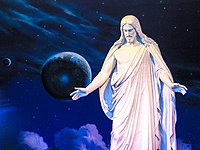God in Mormonism
[9][10][11] This conception differs from the traditional Christian Trinity in several ways, one of which is that Mormonism has not adopted or continued to hold the doctrine of the Nicene Creed, that the Father, Son and Holy Ghost are of the same substance or being.[15] Founder Joseph Smith's teachings regarding the nature of the Godhead changed during his lifetime, becoming most fully developed in the few years prior to his murder in 1844.[16][17] Smith's public teachings described the Father and Son as possessing distinct physical bodies, being one together with the Holy Ghost, not in material substance, but in spirit, glory, and purpose.[21] Mormons see the strong influence of Greek culture and philosophy[22] (Hellenization) during this period as contributing to a departure from the traditional Judeo-Christian view of a corporeal God in whose image and likeness mankind was created.[23]: 18 [24] These theologians began to define God in terms of three persons, or hypostases, sharing one immaterial divine substance, or ousia—a concept that some claim found no backing in scripture,[25][26] but closely mirrored elements of Greek philosophy such as Neoplatonism."[33] In another passage of the Book of Mormon, the prophet Abinadi states, I would that ye should understand that God himself shall come down among the children of men, and shall redeem his people.[41] Steven C. Harper states that because, in the 1830s, Smith privately described to some of his followers his 1820 first vision as a theophany of "two divine, corporeal beings," "its implications for the trinity and materiality of God were asserted that early".[42] In public sermons later in Smith's life, he began to describe what he thought was the true nature of the Godhead in much greater detail.This account, published as part of the church's Pearl of Great Price states that Smith saw a vision of "two personages", the Father and the Son.[non-primary source needed] Smith taught that there is one Godhead and that humans can have a place, as joint-heirs with Christ, through grace, if they follow the laws and ordinances of the gospel.[59][60] Among the resurrected, the righteous souls receive great glory and return to live with God, being made perfect through the atonement of Christ.


texts from within a religion or faith systemGod the FatherJulius SchnorrTheismAgnosticismApatheismAtheismClassical theismHenotheismIetsismIgnosticismMonotheismMonismDualismMonolatryKathenotheismOmnismPandeismPanentheismPantheismPolytheismTranstheismBrahmanCreatorDemiurgeFatherForm of the GoodGreat ArchitectMotherSummum bonumSupreme BeingSustainerTrinityTawhidPersonalUnitarianismAbrahamicJudaismChristianityBaháʼí FaithMandaeismIndo-IranianHinduismBuddhismJainismSikhismYungdrung BonZoroastrianismChineseShangdiHongjun LaozuExistenceGenderOmnibenevolenceOmnipotenceOmnipresenceOmniscienceAseityTranscendenceBeliefEsotericismFideismGnosisHermeticismMetaphysicsMysticismPrayerRevelationWorshipEuthyphro dilemmaGod complexGod geneTheologyOntologyProblem of eviltheodicyReligionphilosophyPortrayals of God in popular mediaMormonismLatter Day SaintsElohimJesus ChristJehovahHeavenly MotherHeavenly ParentsJoseph SmithexaltedNicene Creedsame substancecreate it from nothingethical monotheismorthodoxyAdam–God doctrineseen two personagesProtestant backgroundearly centuries of Christianityhis murder in 1844David L. PaulsenRichard BushmanCraig BlombergStephen H. Webbsocial trinitarianismRobert M. Bowman Jr.tritheismApostlesHellenizationhypostasesNeoplatonismBook of MormonAbinadiAmericasModalismKing Follett DiscourseLorenzo SnowcoupletChristusTemple SquareSalt Lake CityList of Latter Day Saint movement topicsBeliefs and practices of the LDS ChurchMormonism and ChristianityExaltation (Mormonism)the Fatherthe SonHoly Ghost